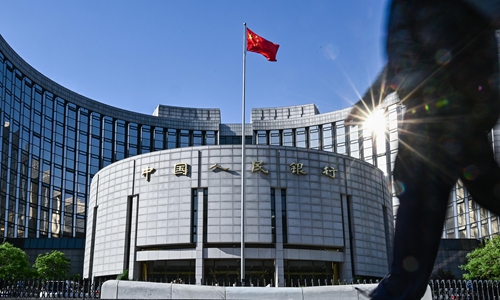
China’s central bank on Monday cut benchmark lending rates by the steepest margin since August 2019 when the market-oriented loan prime rate regime was adopted. The nation is striving to repair the damage of the coronavirus outbreak,which caused GDP to contract in the first quarter. Photo:cnsphoto
Based on a survey of 20 economists conducted by the Global Times, 17, or 85 percent, agreed that China should increase its deficit ratio as COVID-19 poses unprecedented high risks for the economy.
Among the analysts, eight believed the debt ratio for 2020 should be between 3 percent and 4 percent, while three thought the rate should be hiked to 4-5 percent. Six offered their estimation as high as 8 percent.
In 2016 and 2017, China's financial deficit rate was 3 percent. In 2018 that number dropped to 2.6 percent and then increased to 2.8 percent in 2019.
Tang Jianwei, chief economic analyst at the Financial Research Center of the Bank of Communications, told the Global Times that the number could increase to 3 - 3.5 percent to cushion the economy.
"The Chinese government's overall debt level is not high and the leverage ratio of the central government is particularly low, so there is still room to appropriately increase the central government's leverage ratio," Tang said. "From overseas experience, public emergencies usually correspond with an increase in the fiscal deficit ratio of about 1-1.5 percentage points."
"For example, after the outbreak of MERS in South Korea in 2015, its government released a temporary supplementary budget in the middle of the year. The Japanese government released four supplementary budgets after the March 11 earthquake in Japan in 2011. [The supplementary budgets] increased those countries' fiscal deficits by 0.9 percentage points and 1.5 percentage points, respectively," Tang said.
The suggested deficit ratio for China would surpass the international safety line of 3 percent that was determined in the Maastricht Treaty. China's deficit ratio has not surpassed 3 percent in the past decade.
In 2008, amid the global economic crisis, China released a 4 trillion yuan ($562.47 billion) infrastructure investment plan to spur economic growth, aiming to steer the country out of the crisis.
Cao Heping, a professor of economics at Peking University in Beijing, suggested the ratio should increase to 4.5 percent. He told the Global Times that as China witnessed a slowdown in economic growth before the COVID-19 pandemic, it needs an active fiscal stimulus to restart the engine.
"Like driving a car, you need a stronger electric current to start the engine, and the increased deficit ratio is that stronger current," Cao noted.
"The COVID-19 outbreak in China hardly hit the country's economy, which had already seen a slowdown, but the worldwide spread [of the virus] has dealt a heavy blow to China's economic growth," Cao said.
"The total impact on China's economy has surpassed that of the 2008 financial crisis, so it is time for the government to release stronger fiscal measures to boost the economy - even stronger than the 4 trillion yuan stimulus plan in 2008," said Cao.
